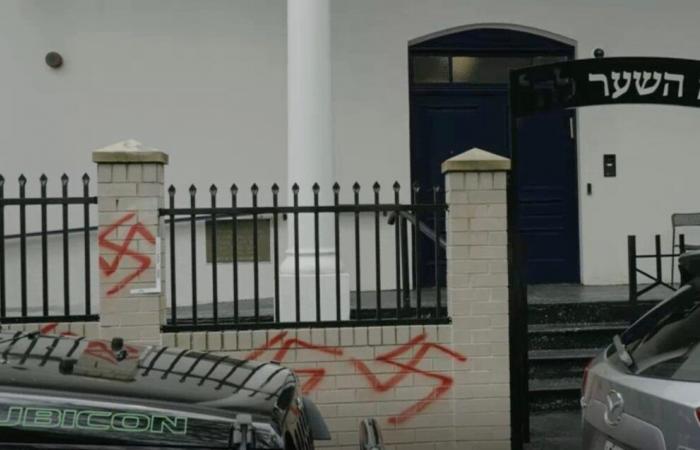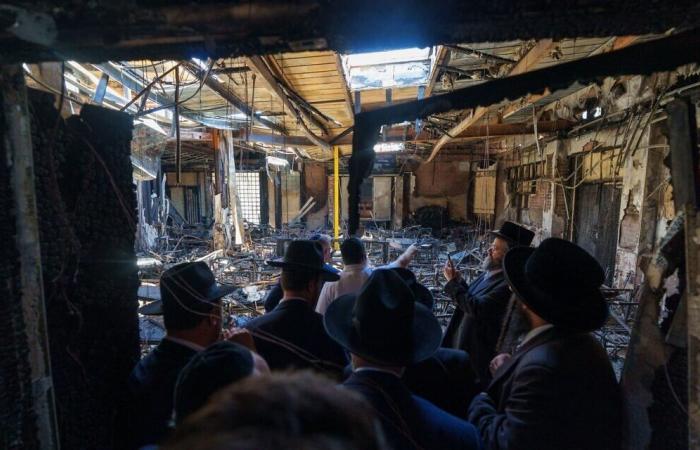An Australian task force tasked with combating anti-Semitic attacks has already received 124 reports of incidents since its establishment last month, of which 102 are under investigation, according to a statement released Tuesday by the Australian Prime Minister’s Office Anthony Albanese.
The statement lists a series of measures taken by the Australian government to combat anti-Semitism since October 7, 2023. It also states that Albanese is “taking steps to eradicate the scourge of anti-Semitism.”
However, following a recent surge in violence – including a series of arsons targeting local synagogues – representatives of Australia’s Jewish community say more action is needed .
To not miss any of the news,
receive the Daily Headline on your email
By registering, you agree to the terms of use
Albanese met with state leaders in Victoria and New South Wales on Tuesday to discuss the rise in anti-Semitic acts. At the end of this meeting, the three agreed to work together to put an end to these facts and ensure that those responsible are punished. The group will coordinate its efforts with Jillian Segal, Australia’s special envoy to combat anti-Semitism, whose position was created last July in response to rising actions against Jews.
Albanese indicated that Segal’s taking office was part of a series of measures taken to improve the situation, including the creation of the special operation Avalite, made up of twenty-one police officers and experts in the fight against counter-terrorism, a group that is responsible for investigating threats to Australia’s Jewish community. Other initiatives include banning the Nazi salute and hate symbols, criminalizing doxxingintroducing legislation banning hate speech, and committing more than $60 million to improve the safety and security of Jewish sites across the country.
Jewish leaders say these efforts are not enough to stem the tide of anti-Semitism. Following last week’s attack on a synagogue in the Sydney suburb of Newtown, Executive Council of Australian Jews (ECAJ) co-chief executive Alex Ryvchin said he was clear that “the government has failed today to grasp the true seriousness of the situation”.
President of the Executive Council of Jewish Australia, Jillian Segal, standing next to co-chief executive Alex Ryvchin during a press conference, in Sydney, October 9, 2023. (David Gray/AFP)
“We need education, policing and sanctions guidelines to drive this terrorism out of our environment,” Ryvchin told Sky News Australia.
“We are in a situation where the community wakes up every morning not knowing which synagogue or which school is going to be affected, and that hurts the community. »
Liberal MP Julian Leeser agrees. “When the government says it has done everything it could [pour lutter contre l’antisémitisme]it’s just a lie,” he said in a television interview shortly after the prime minister’s announcement.
“It’s just like the lie they told the Jewish community before the last election, that there would be no difference in policy towards the Jewish community and Israel between the coalition and the Labor Party. “There has never been a bigger lie in Australian politics,” Leeser said.
The number of anti-Semitic acts in Australia has quadrupled in the year following the pogrom carried out by the Palestinian terrorist group Hamas on October 7, 2023 in southern Israel, and the war that followed.
Anger against the government is strong within the Australian Jewish community, which has some 120,000 members, including many Holocaust survivors. Many criticize the government for what they see as insufficient actions.
Some accuse the left-wing Labor government of being afraid to strongly defend Jewish interests for fear of suffering setbacks in the federal elections scheduled for next summer, where it is counting heavily on Muslim votes. The anti-Semitic arson attack on the Adass Israel synagogue in Melbourne in December was seen by many as a turning point in a situation that had become untenable.
Ryvchin said the surge in attacks was “painfully predictable” following the government’s weak response to the violent anti-Israel protests that followed on October 7, as well as its lack of action over attacks on university campuses, which helped “create room for maneuver in which extremism thrives.”
Australian Prime Minister Anthony Albanese (centre) and members of the local Jewish community visit the burned-out Adass Israel Synagogue in Melbourne, December 10, 2024. (Prime Minister and Cabinet Departments/AFP)
After the attack on the Adass Israel synagogue last month, Ryvchin and other ECAJ leaders sent a letter to Albanese outlining a number of measures needed to quell the crisis, including funding for security communities, teaching anti-Semitism in schools, banning demonstrations outside synagogues, moderating government statements on the Arab-Israeli conflict and a national cabinet meeting of all state leaders and territories to implement uniform policing guidelines.
The ECAJ noted that only one of these elements, community safety funding, has been implemented. But the time has come for the government to stop talking and act more concretely to fight anti-Semitism, he added.







